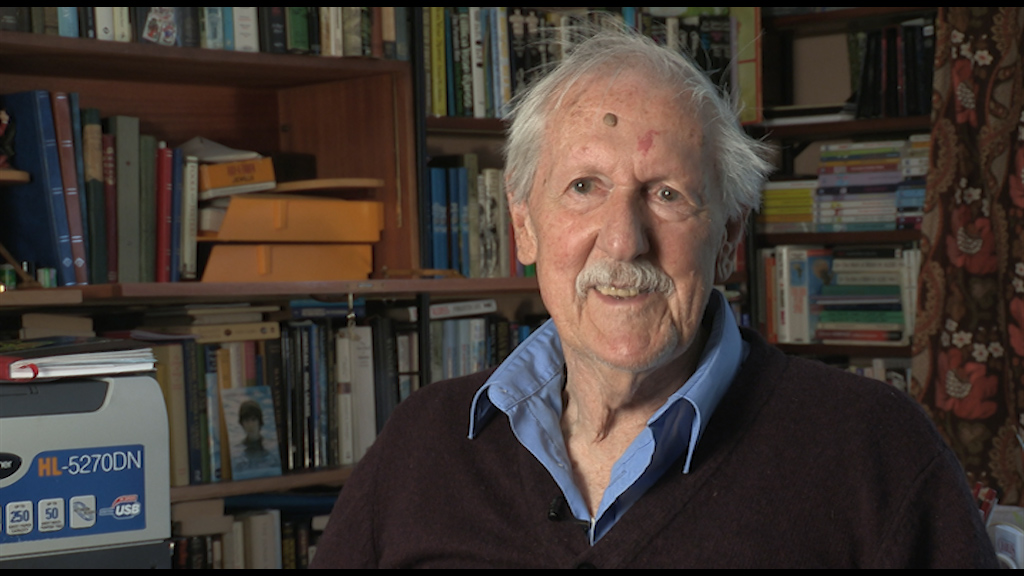NEXT STORY

A dismal homecoming
RELATED STORIES

NEXT STORY

A dismal homecoming
RELATED STORIES


|
Views | Duration | |
|---|---|---|---|
| 31. 'Going Dutch' in Sumatra | 42 | 02:54 | |
| 32. Giving barn dancing a whole new meaning | 34 | 04:26 | |
| 33. How the British Army scuppered my plans for matrimony | 33 | 04:45 | |
| 34. Killing time in Hong Kong | 33 | 03:23 | |
| 35. A dismal homecoming | 34 | 03:11 | |
| 36. Gaining work experience in Oxford’s bookshops | 43 | 03:27 | |
| 37. Creating The Brightfount Diaries | 49 | 04:57 | |
| 38. My journals in the Bodleian Library | 46 | 01:45 | |
| 39. Encountering TS Eliot | 79 | 01:48 | |
| 40. Colin Wilson in London | 61 | 01:35 |


And then we got posted to Hong Kong. And Hong Kong was really short of... well, actually, it was short of British to run the place and so, for a brief while, possibly for not more than a month, I became head of the Hong Kong Telephone Exchange, which was not as enjoyable as it had been when I had been running the barn in Sumatra. But, it was something, and on at least two occasions, we drove out in trucks with staves to beat up crooks who were trying to cut the telephone lines to Stanley at the other side of the island, because they could get a lot of money for the cable. So, yes – we found them one night and gave them a few bashes, and off they went. So…
But also, we were more peaceful. We went swimming in Big Wave Bay it was called... beautiful.
These days, of course, Hong Kong and Singapore have become so much bigger and so much over-built. I wouldn't think they're quite as nice as they were then. They were lovely then; Hong Kong was delightful. And, yes, we drove all over the place – no-one shot at us. I can't think of anything against the place, really, except that we were stuck there and by this time, I think we thought it was time we went home.
And so, eventually, a ship called... what was it called? I can't remember what it was called at the moment, but I think I will remember it. It came near the docks, and we were taken by rowing boat or motor boat out to the ship. And I knew this meant that I had to cease to be a kind of brigand, I would have to cultivate myself. And so I bought... what did I buy? The great sea-faring epic from Greek times. What am I talking about?
[Q] The Odyssey.
The Odyssey! Yes, I bought a copy of The Odyssey to read. And so there I sat on the deck as the waves foamed by, reading The Odyssey. And, eventually, we got back to England, with the results that I have already given you.
Brian Aldiss (1925-2017) was an English writer and anthologies editor, best known for his science fiction novels and short stories. He was educated at Framlingham College, Suffolk, and West Buckland School, Devon, and served in the Royal Signals between 1943-1947. After leaving the army, Aldiss worked as a bookseller in Oxford, an experience which provided the setting for his first book, 'The Brightfount Diaries' (1955). His first science fiction novel, 'Non-Stop', was published in 1958 while he was working as literary editor of the 'Oxford Mail'. His many prize-winning science fiction titles include 'Hothouse' (1962), which won the Hugo Award, 'The Saliva Tree' (1966), which was awarded the Nebula, and 'Helliconia Spring' (1982), which won both the British Science Fiction Association Award and the John W Campbell Memorial Award. Several of his books have been adapted for the cinema. His story, 'Supertoys Last All Summer Long', was adapted and released as the film 'AI' in 2001. His book 'Jocasta' (2005), is a reworking of Sophocles' classic Theban plays, 'Oedipus Rex' and 'Antigone'.
Title: Killing time in Hong Kong
Listeners: Christopher Sykes
Christopher Sykes is an independent documentary producer who has made a number of films about science and scientists for BBC TV, Channel Four, and PBS.
Tags: Hong Kong, Singapore, The Odyssey
Duration: 3 minutes, 23 seconds
Date story recorded: September 2014
Date story went live: 17 August 2015